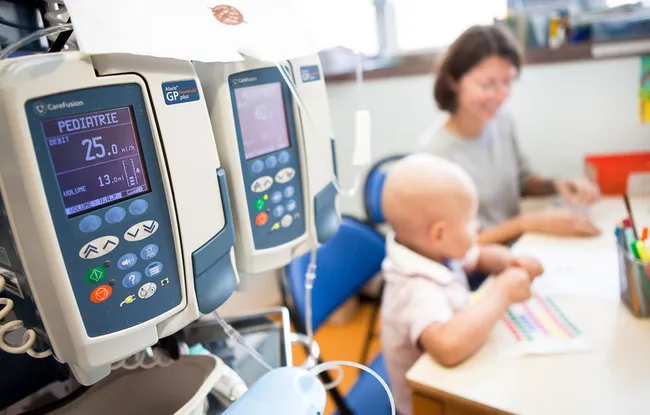- Home >
- Institut Curie News >
- High-risk neuroblastoma: targeted therapy could be used in first line treatment
Every year in France, about 150 children are affected by neuroblastoma, half of them under the age of 2 years. This is the third most common type of pediatric cancer after leukemia and brain cancer. This solid tumor grows from cells that make up the sympathetic nervous system and can be found in the adrenal glands and also along the spine.
This cancer can evolve in many different ways. While in some cases it spontaneously regresses, half of the children suffer from an aggressive form: high-risk neuroblastoma.
This cancer is characterized by metastatic forms in children over 12 months of age, or the presence of an amplified MYCN oncogene regardless of the stage of the disease or the age of the child.
,explains Dr. Gudrun Schleiermacher, oncopediatrician and researcher at Institut Curie. She adds:
The prognosis is grim. Barely half of the children live beyond five years after diagnosis, despite chemotherapy treatment, including high dose chemotherapy, surgery, radiotherapy and immunotherapy. There is still progress to be made.
Among the possible avenues, as part of the work of the Biology group of SIOPEN (European neuroblastoma research organization) chaired by Dr Schleiermacher, Institut Curie wanted to evaluate the role of alterations in the ALK gene. These were identified in 2008 by the team of Prof. Olivier Delattre, director of the Genetics and Biology of Cancer Unit at Institut Curie in Paris. An important discovery as they have become the first molecular target of neuroblastoma. Since then, several ALK inhibitors have been developed and are undergoing clinical trials.
Until today however, the frequency of these alterations had never been assessed in high-risk neuroblastoma patients.
We don’t look for them at the time of diagnosis but when there is a relapse or if the disease progresses, as they can appear during the course of the disease
, explains Doctor Schleiermacher.
Therefore, to better understand how these cancers develop, the SIOPEN group studied the presence of alterations of the ALK gene (gene amplification or mutation) in a cohort of 1092 children treated between 2002 and 2019 in 132 hospitals across 19 European countries.
This cohort is unique, because of its size but also because all children received the same treatment protocols. They were therefore comparable, which makes it possible to obtain robust results
, adds Dr. Schleiermacher.
According to recent work published in the Journal of Clinical Oncology, mutations are present in about 14% of patients newly diagnosed with high-risk neuroblastoma. And nearly 4% have amplification of this gene. More importantly, these abnormalities are associated with a lower rate of survival. They are therefore important prognostic markers
Because ALK can be targeted therapeutically, this study makes a compelling case for the introduction of ALK inhibitors in the initial treatment of high-risk neuroblastoma patients with alterations in this gene. Now, we need to clinically evaluate the value of this new treatment in children with high-risk neuroblastoma
, Doctor Schleiermacher concluded.
|
This study is supported by the Annenberg Foundation and the Association Hubert Gouin Enfance et Cancer, France. This study was also funded by the Fédération Enfants Cancers Santé, Les Bagouz à Manon, Les amis de Claire. Funding was also obtained from SiRIC/INCa (Grant INCa-DGOS-4654) and PHRC IC2007-09 grant. High-throughput sequencing was performed by the ICGex NGS platform of the Institut Curie supported by the grants ANR-10-EQPX-03 (Equipex) and ANR-10-INBS-09-08 (France G´enomique Consortium) from the Agence Nationale de la Recherche (Investissements d’Avenir program), by the Canceropole Ile-de-France. |
|
Référence: Frequency and Prognostic Impact of ALK Amplifications and Mutations in the European Neuroblastoma Study Group (SIOPEN) High-Risk Neuroblastoma Trial (HR-NBL1). |



